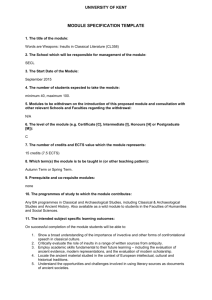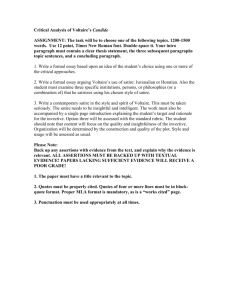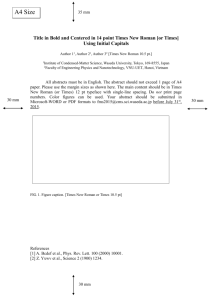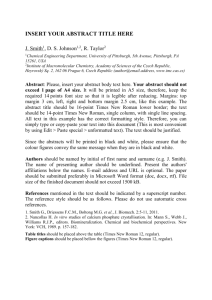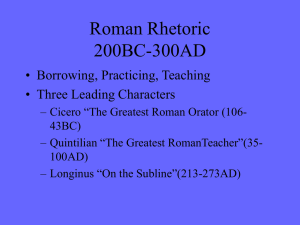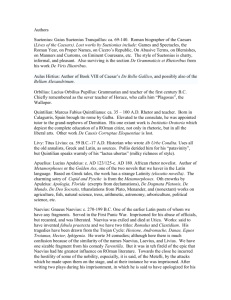Abstract
advertisement
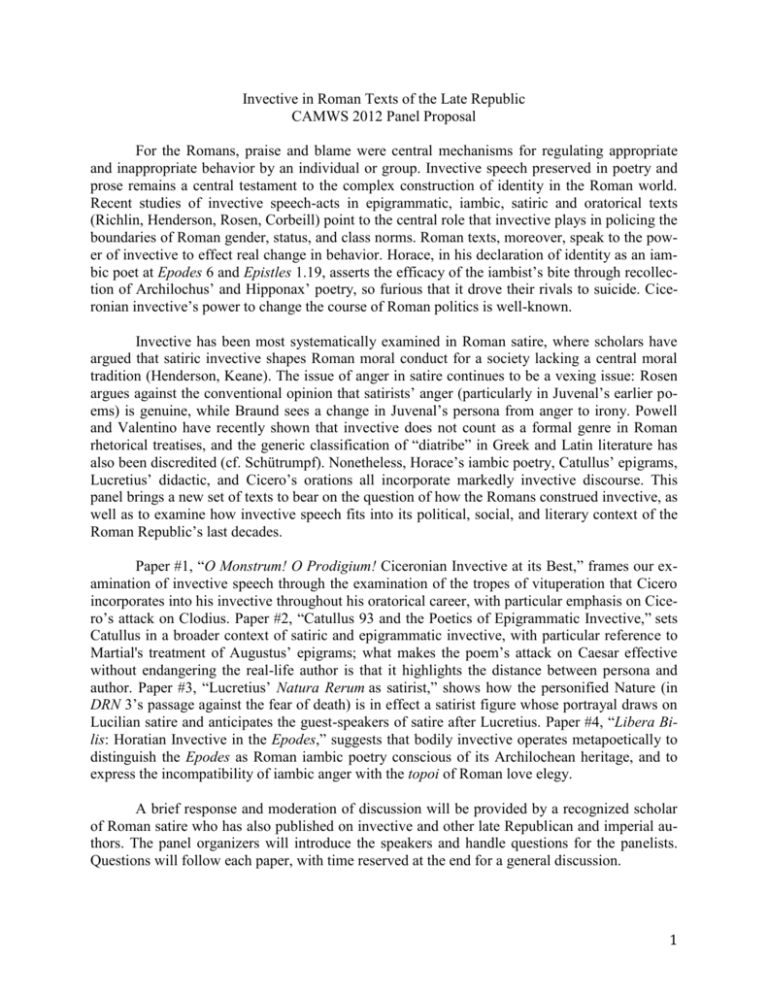
Invective in Roman Texts of the Late Republic CAMWS 2012 Panel Proposal For the Romans, praise and blame were central mechanisms for regulating appropriate and inappropriate behavior by an individual or group. Invective speech preserved in poetry and prose remains a central testament to the complex construction of identity in the Roman world. Recent studies of invective speech-acts in epigrammatic, iambic, satiric and oratorical texts (Richlin, Henderson, Rosen, Corbeill) point to the central role that invective plays in policing the boundaries of Roman gender, status, and class norms. Roman texts, moreover, speak to the power of invective to effect real change in behavior. Horace, in his declaration of identity as an iambic poet at Epodes 6 and Epistles 1.19, asserts the efficacy of the iambist’s bite through recollection of Archilochus’ and Hipponax’ poetry, so furious that it drove their rivals to suicide. Ciceronian invective’s power to change the course of Roman politics is well-known. Invective has been most systematically examined in Roman satire, where scholars have argued that satiric invective shapes Roman moral conduct for a society lacking a central moral tradition (Henderson, Keane). The issue of anger in satire continues to be a vexing issue: Rosen argues against the conventional opinion that satirists’ anger (particularly in Juvenal’s earlier poems) is genuine, while Braund sees a change in Juvenal’s persona from anger to irony. Powell and Valentino have recently shown that invective does not count as a formal genre in Roman rhetorical treatises, and the generic classification of “diatribe” in Greek and Latin literature has also been discredited (cf. Schütrumpf). Nonetheless, Horace’s iambic poetry, Catullus’ epigrams, Lucretius’ didactic, and Cicero’s orations all incorporate markedly invective discourse. This panel brings a new set of texts to bear on the question of how the Romans construed invective, as well as to examine how invective speech fits into its political, social, and literary context of the Roman Republic’s last decades. Paper #1, “O Monstrum! O Prodigium! Ciceronian Invective at its Best,” frames our examination of invective speech through the examination of the tropes of vituperation that Cicero incorporates into his invective throughout his oratorical career, with particular emphasis on Cicero’s attack on Clodius. Paper #2, “Catullus 93 and the Poetics of Epigrammatic Invective,” sets Catullus in a broader context of satiric and epigrammatic invective, with particular reference to Martial's treatment of Augustus’ epigrams; what makes the poem’s attack on Caesar effective without endangering the real-life author is that it highlights the distance between persona and author. Paper #3, “Lucretius’ Natura Rerum as satirist,” shows how the personified Nature (in DRN 3’s passage against the fear of death) is in effect a satirist figure whose portrayal draws on Lucilian satire and anticipates the guest-speakers of satire after Lucretius. Paper #4, “Libera Bilis: Horatian Invective in the Epodes,” suggests that bodily invective operates metapoetically to distinguish the Epodes as Roman iambic poetry conscious of its Archilochean heritage, and to express the incompatibility of iambic anger with the topoi of Roman love elegy. A brief response and moderation of discussion will be provided by a recognized scholar of Roman satire who has also published on invective and other late Republican and imperial authors. The panel organizers will introduce the speakers and handle questions for the panelists. Questions will follow each paper, with time reserved at the end for a general discussion. 1 This panel articulates a new synthesis of how Romans in the late Republic used invective, and examines the significance of invective speech when it occurs outside satire. These authors straddle the period of Roman civil wars; their texts betray an intense, if at times indirect, interest in the political transformations effected during the triumviral period by Caesar, Antony, and Octavian. It is our hope that this conversation will rekindle interest in Roman invective and foster further consideration of the connections between attack-speech and humor across generic boundaries. Bibliography Braund, S. 2007. Beyond Anger: A Study of Juvenal’s Third Book of Satires. Corbeill, A. 1996. Controlling Laughter: Political Humor in the late Roman Republic. Henderson, J. 2009. “Horace Talks Rough and Dirty: No Comment (Epodes 8 & 12).” M. Lowrie, ed., Oxford Readings in Classical Studies. Horace: Odes and Epodes, 401–417. Keane, C. 2006. Figuring Genre in Roman Satire. Powell, J.G.F. 2007. “Invective and Orator: Ciceronian Theory and Practice.” J. Booth, ed., Cicero on the Attack: Invective and Subversion in the Orations and Beyond, 1–23. Richlin, A. 1992. The Garden of Priapus: Sexuality and Aggression in Roman Humor. Rosen, R. 2007. Making Mockery: The Poetics of Ancient Satire. Schütrumpf, E. 1998. “Lucretius De Rer. Nat. III (830–1094)—a Diatribe against the Fear of Death?” A.E. Radke, ed., ‘Candide Iudex’. Beiträge zur augusteischen Dichtung, 346– 351. Valentino, A. 2007. “Roman oratorical invective.” W. Dominik and J. Hall, edd., A Companion to Roman Rhetoric, 149–162. 2 Paper # 1: “O Monstrum! O Prodigium!” Ciceronian Invective at its Best M. Tullius Cicero, consul in 63 and pre-eminent statesman and advocate of his day, had a keen intelligence, a lively wit, and a sharp tongue—sharpest when dealing with his enemies. Indeed, during his long political and forensic career, Cicero made a number of enemies; many of them are well known to us through his speeches. Verres, corrupt governor of Sicily (70); Catiline, mad revolutionary of 63; Clodius, engineer of Cicero’s exile in 58; Vatinius and Piso, objects of vituperative speeches in 54; Antony, pilloried in the Philippics in Cicero’s last years—all of these are the recipients of some of Cicero’s finest invective. Devastating, witty; sarcastic, ironic; reflecting truth or falsehood, innuendo or fact; Cicero on the attack was a formidable opponent. In this paper, I will examine the various invective topoi and discuss their nature and application. The topoi suitable for judicial and political invective are wide-ranging; Cicero himself gives a list of appropriate insults at De Inventione 100-105, and scholars such as Nisbet (1961), Opelt (1965), May (1988), Corbeill (2002), Craig (2004), Powell, Seager, and Steel (2007) have refined and expanded on these topoi. They range from snide comments about the opponent’s lowly family origins; his physical appearance, dress and embarrassing habits (drunkenness, gluttony, bizarre sexual predilections); money troubles of various sorts (debt, squandering one’s patrimony, taking or giving bribes), and so on; even oratorical ineptitude is included. There is certainly ample scope and variety, but the orator must select his words carefully, making sure that he chooses and aims the appropriate insult(s) most effectively. Cicero must take into account his opponent’s status (a senator? a consul? a political enemy?); the situation (a trial? a speech in the senate? to the public?); and the hoped-for result of the invective (public humiliation? conviction? action by the senate?). Although they may be similarly tarred with Cicero’s invective brush, circumstances and personalities require different applications of the insulting “paint.” Cicero’s prosecution of Verres in 70 provides the opening salvo in his war of words. As is well known, Cicero made his case against Verres so strongly that the disgraced governor fled into exile after the first action of the trial. What role did invective play in this speech? What kinds of insults did Cicero use, and how can we judge their effectiveness in a legal setting? How does the Consul Cicero’s treatment of Catiline in 63 differ? Catiline also left Rome after one speech against him; are these two situations comparable? Later on, in the 50s, Cicero’s attacks on Clodius, Piso and Vatinius are motivated by desire to avenge the humiliation of his exile and its aftermath. Does Cicero treat these scoundrels differently than earlier objects of his vituperation? And finally there is Antony, Cicero’s bête noire and destroyer of the Republic—what kind of invective fury does Cicero unleash on this loathsome monster? After briefly examining these cases of invective speech by Cicero, I will identify his invective choices and analyze their particular and personal effect on one opponent, Clodius. I hope to show how Cicero tailors his attack to get “the biggest bang for his buck” by adjusting his invective to the immediate situation and the goal(s) of his speech. All invective is not alike, and a close look at some specifics of vituperation will reveal how Cicero is the master of nuanced invective. 3 Works Consulted Craig, C. “Audience expectation, invective and proof,” in J. Powell and J. Patterson, eds., Cicero the Advocate (Oxford, 2004), 187-213. Corbeill, A. “Ciceronian Invective,” in J. May, ed., Brill’s Companion to Cicero (Leiden 2002), 197-217. Dyck, A. R., ed. Cicero’s Catilinarians (Cambridge, 2008). Lévy, C. “Rhetorique et philosophie: la monstruosité politique chez Cicéron” REL 76 (1998), 139-57. May, J. Trials of Character. The Eloquence of Ciceronian Ethos (Chapel Hill, 1988). ______. “Cicero and the Beasts,” Syllecta Classica 7 (1996), 143-53. Nisbet, R.G.M., ed. M. Tulli Ciceronis in L. Calpurnium Pisonem Oratio (Oxford 1961). Opelt, I. Die lateinischen Schimpfwörter und verwandte sprachliche Erscheinungen. Eine Typologie (Heidelberg, 1965). Pocock, L. G. A Commentary on Cicero In Vatinium (London, 1926). Powell, J. G. F. “Invective and the Orator: Ciceronian Theory and Practice, in J. Booth, ed., Cicero on the Attack: Invective and Subversion in the Orations and Beyond (Swansea, 2007), 1-23. Riggsby, A. R. “The Rhetoric of Character in the Roman courts,” in J. Powell and J. Patterson, eds., Cicero the Advocate (Oxford, 2004), 165-85. Seager, R. “Ciceronian Invective. Themes and Variations,” in J. Booth, ed., Cicero on the Attack: Invective and Subversion in the Orations and Beyond (Swansea, 2007). Steel, C. “Name and Shame: Invective against Clodius and others in the Post-exile Speeches,” in J. Booth, ed., Cicero on the Attack: Invective and Subversion in the Orations and Beyond (Swansea, 2007). 4 Paper # 2: Catullus 93 and the Poetics of Epigrammatic Invective In this paper I will explore the relationship between Catullus’ persona and invective speech in his epigrams. I will show that Catullus exploits the ambiguity of authorial voice especially as a vehicle for politicized invective. Given the political climate of the late Republic, wherein long held hierarchies and traditions of political intercourse were eroding, Catullus’ voice seems like a brazen attempt to renew the free expression which characterized an earlier period of Roman political speech. In contrast, the response of Catullus’ Roman readers to his attacks on the political elite of his day suggest that they read Catullus as a rogue poet, unconcerned with life or limb in the exercise of his invective. In the literary, particularly satiric, tradition, Catullus’ political invective becomes a model of manly free speech, while, in the epigrammatic tradition, Catullus is much more a model of urbane, witty elegance. This contrast between virile simplicitas and elegant urbanitas, as David Wray has argued, is part of Catullus’ poetic performance of Roman masculinity. However, the epigrammatic reception of Catullus, in as much as it largely omits mention of his invective speech (admittedly, to justify its own poetic strategies of panegyric), makes stark the presence of political invective in Catullus’ epigrams. In an effort to avoid the label Quintilian (11.1.38) applies to Catullus in his discussion of poem 93, insanus, and the repercussions such a label would have under an emperor, Martial draws on a different epigrammatic model for his invective voice, Augustus (11.20). In 11.20, Martial conflates his voice with that of Augustus when justifying his frank speech, appropriating earlier political invective for his modern poetic agenda. Martial’s conflation of voices, with Catullus for elegance and the emperor for invective, creates a distance between author and persona. A similar process is at work in Catullus, whose iambic poems create a distance between author and persona through a multiplicity of voice (Lavigne 2010). As a case study, I will examine Catullus’ invective treatment of Caesar in poem 93. If we, along with Quintilian, are inclined to read a poem like 93 as an insane attack on a much more powerful man, how are we to understand the rather innocuous reception of the poem in Catullus’ day? Some critics have resorted to the relationship between Catullus’ family and Caesar, others have suggested that such verbal sparring is something of a test of manhood (and to respond in kind would be dangerous for the target of the attack). Both privilege a biographical reading. When we recall the context of the passage of Quintilian (his denouncement of Catullus’ speech as insane is part of a larger discussion of the proper tone that people of different statures should adopt in order to speak most effectively), we realize that the persona (tone) and author (speaker) of political invective have been aligned. It is precisely in highlighting the distance between his status (persona) and the tone of his invective that Catullus creates an effective epigram. Bibliography Lavigne, D. “Catullus 8 and Catullan Iambos.” SyllClass 21 (2010): 65-92. Wray, D. Catullus and the Poetics of Roman Manhood. (Cambridge: Cambridge University Press, 2001). 5 Paper # 3: Lucretius’ Natura Rerum as satirist During the much-discussed invective against the fear of death at the end of the third book of De Rerum Natura, the speaker gives voice to a remarkable figure, the Nature of the Universe herself, who berates the addressee for having so much anxiety over the end of life (3.931–962). The prosopopoieia of Natura Rerum is emblematic of the broader connections between De Rerum Natura and Graeco-Roman invective literature (particularly diatribe: so Wallach, Kenney) and is not dependent upon the writings of Epicurus, in contrast to much of the poem’s content and argumentation (so Reinhardt). In this paper I argue that Natura Rerum should additionally be classified as a satirist figure, consistent with the satiric speakers of Greek and Latin literature, particularly the voices of Roman satire. Nature herself, in Lucretius’ poem, speaks in a forceful, satiric, and very Roman fashion: the figure of Natura Rerum draws upon not only diatribe but also the satires of Lucilius, and anticipates the guest-speakers of Roman satire after Lucretius. Scholarship on De Rerum Natura has noted to a limited extent the use of satire in the poem as a whole (Houghton, Murley, Waltz, Dudley, Minyard), but the role of Natura Rerum as satirist has not been previously identified. The key characteristics of the satirist (that Bogel, Plaza, Rosen, and others have shown) are, I argue, present in book 3’s figure of Natura Rerum. There is, for example: (1) comic mockery and blame. Natura Rerum castigates the addressee with colloquial, sometimes comic language (e.g., 3.954/5: “get them tears outta here, you great chasm, and quit your whining!”). (2) Justified indignation at some fault or flaw. In the prosopopoieia’s frame, the poem’s narrator affirms that she is waging a “just lawsuit” (950), and her stream of rhetorical questions at 931–943 is a conventional way of expressing satiric indignation. (3) The creation of a collusive relationship with the audience, who is invited or impelled to join the satirist in laughing at the target. Natura Rerum treats the addressee of her tirade harshly and thus she pushes the reader to identify not with the fool but with the satiric speaker herself—just like the reader of De Rerum Natura as a whole is pushed to identify with the narrator rather than with Memmius (cf. Mitsis). As a guest-speaker who stands in for the poem’s main narrator, Natura Rerum is comparable to the substitute satirists of both Horace (e.g., the philosophical assailants Damasippus of Sermones 2.3 and Davus of 2.7) and Juvenal (Umbricius in poem 3, Naevolus in poem 9, and most importantly Laronia in poem 2). Yet unlike Horace’s and Juvenal’s personifications, who are lowclass and generally hypocritical (and so may undercut or further debase sthe tone of the satire), Natura Rerum adds a sense of greater authority to the Lucretian narrator’s argument in book 3. With the voice of Nature on his side, the narrator carries more weight and can argue more persuasively against the fears of fools desperately clinging to mortal life. The satiric dictates of the natural universe furthermore lend support to the Lucretian narrator’s ethical intervention in the Roman society of his troubled times. A defining trait of satirists is their criticism not only of individuals’ faults but of the greater social problems of their Roman world, and their professed interest in its social improvement—what Henderson calls satire’s “civic discourse.” Though the speech of Natura Rerum is primarily focused on an individual target, I assert that her argument nevertheless plays a role in advancing the social/moral objectives of the poem’s narrator. 6 Bibliography Bogel, F.V. 2001. The Difference Satire Makes: Rhetoric and Reading from Jonson to Byron. Ithaca. Dudley, D.R. 1965. “The Satiric Element in Lucretius.” In D.R. Dudley, ed., Lucretius. New York. Henderson, J.G.W. 1993. “Be Alert (Your Country Needs Lerts): Horace, Satires 1.9.” PCPS 39:67–93. Houghton, H.P. 1912. “Lucretius as Satirist.” TAPA 43:xxxiv–xxxix. Kenney, E.J. 1971. Lucretius De Rerum Natura Book III. Cambridge. Minyard, J.D. 1985. Lucretius and the Late Republic: An Essay in Roman Intellectual History. Leiden. Mitsis, Phillip. 1993. “Committing Philosophy on the Reader: Didactic Coercion and Reader Autonomy in De Rerum Natura.” MD 31:111–128. Murley, Clyde. 1939. “Lucretius and the History of Satire.” TAPA 70:380–395. Plaza, Maria. 2006. The Function of Humour in Roman Verse Satire: Laughing and Lying. Oxford. Reinhardt, Tobias. 2002. “The Speech of Nature in Lucretius’ De Rerum Natura 3.931–71.” CQ 52.1:291–304. Rosen, R.M. 2007. Making Mockery: The Poetics of Ancient Satire. Oxford. Wallach, B.P. 1976. Lucretius and the Diatribe against the Fear of Death: De Rerum Natura III 830–1094. Leiden. Waltz, René. 1949. “Lucrèce satirique.” Lettres d’humanité 8:78–103. 7 Paper # 4: Libera Bilis: Horatian invective in the Epodes In his iambic collection, the Epodes, Horace explores many of the characteristics of Archilochean invective, including unchecked rage directed against targets (the military tribune, Ep. 4, Mevius, Ep. 10, the Vetulae, Ep. 8 and 12), the use of contesting voices (Ep. 2, 5, 17), animal imagery, and the unrestrained discussion of sexualized bodies (on these as Archilochean, see Mankin, Watson). Yet Horatian iambic continually notes the unmartial status and weakness of the speaker’s body: he is programmatically imbellis ac firmus parum (Ep. 1.16) and in his final appearance is jaundiced, breathless, feverish, and aged on account of Canidia’s powers (Ep. 17. 21-26, 31-34). The influential work of Fitzgerald and Oliensis have shown that the impotentia characteristic of the Horatian speaker can be understood in light of the political and social dislocations of the Roman elite in the period of instability between Caesar’s assassination and the Augustan settlement post-Actium. Watson, Harrison, and Barchiesi propose that Horace writes Archilochean iamboi softened through the influence of Roman love elegy, and by Horace’s social status as a new client of Maecenas. This paper will argue that Horace uses the language of the body to differentiate his first collection of Roman lyric poetry from the genre of love elegy and to align his iambic poetry with the invective traditions of Archilochus, Callimachus, and Catullus. In a collection richly aware of its own poetic genealogy (Barchiesi 2001), I will argue that bodily invective functions metapoetically to delineate what Roman iambic ought to look like. This paper will concentrate on Epodes 11 and 12 as test cases of metapoetic bodily invective, but poetic language throughout the Epodes links the human body with the creation of iambic content (e.g., scorn for the tribune in Ep. 4 is expressed with a facial expression, liberrima indignatio, 11-12). Epodes 11 and 14 look to Roman love elegy and Horace’s rejection of its themes. Metapoetic mockery of elegiac tropes, physically performed by the Horatian speaker, proclaims love elegy a genre incapable of sustaining the iambic themes of rabies, indignatio, and bilis that the Roman epodist has taken up. In Epode 11, the Horatian speaker uses the struggle in his own body between the heat of free bile, libera bilis, and the wound of love in order to explore the generic rivalry between iambic and elegiac modes (16-17). The poem, the first Epode to incorporate elegiac meter, further mocks the elegiac trope of the exclusus amator with iambic and explicit imagery (21-22). Epode 14 returns to the incompatibility between Roman iambic and elegiac themes, when the speaker claims that soft idleness, mollis inertia, prevents him from writing the iambic collection he promised to Maecenas (14.1, 7). Epode 12 also mingles highly literary language with coarse, euphemistic sexual metaphors of the body. The Vetula’s speech (12.14 – 27) juxtaposes metaliterary references to Hellenistic and Roman Alexandrianism with invective against the speaker’s impotence and an animal comparison. Her speech, I will argue, mirrors the literary rage the Horatian iambist exhibits. The speaker meanwhile criticizes her unchecked madness, indomita rabies, the very emotion that the late Horace says drove Archilochus to invent iambic meter (Archilochum proprio rabies armavit iambo, Ars Poetica 79). Thus, metapoetic bodily language anticipates the assimilation of the elegiac mistress to the shape and style of the elegiac meter. Horatian iambic, however, uses the speaker’s own body, with its impotentia and illness (e.g., the nausea of the Actium Epode), to express the political and social uncertainties a young Horace faced, as well as to articulate the struggle of a poet poised between the libera bilis of invective and the mollis inertia of love poetry. 8 Works Consulted: Barchiesi, A. 2001. “Horace and Iambos: The Poet as Literary Historian.” In In Cavarzere, A., Aloni, and Barchiesi, eds. Iambic Ideas. Essays on a Poetic Tradition from Archaic Greece to the Late Roman Empire. Lanham, MD, 141-164. Fitzgerald, W. 2009. “Power and Impotence in Horace’s Epodes.” In M. Lowrie, ed. Oxford Readings in Classical Studies. Horace: Odes and Epodes. Oxford, Harrison, S. 2001. “Some Generic Problems in Horace’s Epodes: Or, On (Not) Being Archilochus.” In Cavarzere, A., Aloni, and Barchiesi, eds. Iambic Ideas. Essays on a Poetic Tradition from Archaic Greece to the Late Roman Empire. Lanham, MD, 165186. Mankin, D. 1995. Horace. Epodes. Cambridge. Oliensis, E. “Canidia, Canicula, and the Decorum of Horace's Epodes.” Arethusa 24: 107-34. Watson, L. 2003. A Commentary on Horace’ Epodes. Oxford. 9
